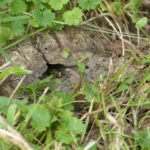
Yellow Jackets work the day shift.
We were recently concerned to find a Yellow Jacket nest close to our front door. Normally we appreciate their ambitious work catching insect prey. If they had made their nest in an out of the way place, we would have left them alone. But, their nest location invited painful stings to us or visitors. They had to go.
Several species of Yellow Jackets live in the United States. Most make an underground nest that can have an opening on the soil surface upwards of an inch in diameter. It can be nearly anywhere, but the nest we found was beneath the lawn next to the walkway into the house.
Yellow Jacket queens overwinter and begin laying eggs in the spring. By late summer or fall, the few Yellow Jackets that were around in spring have multiplied into colonies that can have hundreds of individuals. The workers die in late fall.
Many people discover a Yellow Jacket nest when they walk by it or mow the lawn over the entrance. Angry insects instantly attack and often a hapless person is stung many times in a second or two. Stings really hurt. It’s happened to us more than once, so now we don’t tolerate a nest near the house.
Eliminating a Nest
We only kill a Yellow Jacket colony if it’s located where we, or visitors, might be stung. Here’s how we do it:
Yellow Jackets work the day shift. Although they sometimes are out flying in the early evening by dark the entire colony is home underground in the nest. The nest entrance is easily spotted during the day by dozens of Jackets coming and going. We note its location. After dark we approach with a flashlight, spray can of insect killer, and a piece of cardboard, a board, or an old hunk of carpet. The flashlight helps find the hole. We spray a generous amount of poison down the hole, cover it with the carpet, board, or cardboard and weight it down with a rock. The covering keeps the spray in the nest.
The next morning, we watch for Yellow Jacket activity. Usually, there is none, telling us we destroyed the colony. We remove the covering, but if we see some Yellow Jackets we respray at night and cover the nest again. That usually solves the problem.


Here’s an ecologically safe way to get rid of yellow jackets that nest in the ground: at night, cover hole (or holes; sometimes there are two) with a clear glass item like a jar. This will take a couple days but it will suffocate yellow jackets without using poisons. During the daytime you can observe the jackets trying to exit (and you may see a lot depending on how developed their underground nest is) but they’ll be dead in a few days. This was recommended to me by the Georgia Dept. of Agriculture when I first moved here, unwittingly mowed over their nest and received several painful stings.
Thanks, Christine!